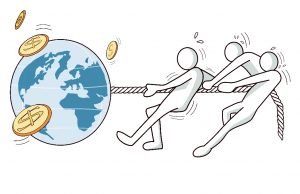How to Survive in a Harsh Economy: Nigeria’s economy has yet to completely recover from the effects of the last recession, which ended in 2018. Despite what the government’s economic gurus would have you think, the economy is in horrible health today. According to the World Poverty Clock, produced by the Vienna-based World Data Lab, around 91 million Nigerians have accepted abysmal poverty.
Between November 2018 and February 2019, around 3 million people fell back into severe poverty. By this measure, we haven’t seen the worst yet; the worst is yet to come. This essay will teach you how to Survive Harsh Economic Situations Both Inside and Outside the Country.
Recommended: Smartest People In The World With High IQ
How to Survive in a Harsh Economy
1. Encourage the practice of car pulling in your organization: When the economy is bad, one of the areas that suffers the most is transportation, and cutting your transportation costs may save you a lot of money. Encourage vehicle pulling among your staff as one of the greatest methods to save transportation costs.

What exactly is automobile pulling? It is basically a procedure in which multiple passengers board a same vehicle to go to the same location. Apart from saving you money, automobile pulling is also incredibly environmentally beneficial.
2. Reduce your operational costs: Another strategy to guarantee that your company survives in a difficult economic situation is to look at areas in your organization’s operations where you may minimize costs without affecting the outputs generated.

As we said before when discussing discovering less costly options, decreasing operating costs by downsizing, or reducing your work force, would go a long way toward ensuring that your firm survives the difficult economy.
Recommended: Most Expensive Universities In The World
3. Identify necessities: In an economic downturn, the only way to safeguard your survival and that of your organization is to look around and identify products that are really important. That is, if economic circumstances change, you must diversify your firm. The greatest method for your company to survive in difficult economic times is to provide things that are really vital to customers, since anything less would result in decreased patronage and, as a result, minimal or no earnings.

4. Locate less costly alternatives: In order to reduce your expenditures, you must locate alternatives to goods you routinely use in your company or at home that are less expensive than what you were previously using. You should, however, ensure that the alternatives you suggest do not have a detrimental impact on their intended usage.

For example, if you identify a less expensive material for your production and the material has a negative effect on the output, making the product less in terms of quality than it should otherwise have been much to the attention of customers, it can be said that the lower quality material you used did not achieve its intended purpose, and thus it would have a negative effect on your sales.
Recommended: Countries with the Worst Weather
5. Avoid impulsive purchases: If the status of the economy gets so severe that you are forced to limit your spending by a substantial margin, the easiest method to do so is to avoid impulse purchases. purchasing on the spur of the moment is just purchasing what you intended to purchase in the first place.

So, how can you prevent impulsive purchases? To prevent impulsive purchases, make a list of the products you need before going shopping, as this will advise you on what to buy and what not to buy, allowing you to carry an amount of money that approximates your budgeted list.
6. Develop a saving culture: Regardless of your salary, you must adopt the notion of saving something everytime you make money. Don’t use the false argument that your costs vastly outnumber your income, leaving you with little to save. Savings is a fundamental human attribute since a rainy day is unavoidable, but the day and hour are unknown.

Consider health difficulties at strange hours, when your pals vanish into thin air and are inaccessible; where do you go from there, when time is of the importance and even the smallest delay might be disastrous? To underline the importance of saving, even if you save an unanticipated passive income, it will go a long way toward increasing your savings.
Recommended: Most Dangerous Foods in The World
7. Don’t go into debt: Being in debt all the time is a poor mentality. Your financial condition may justify the odd lapse into debt, but when you do, establish plans to pay it off. Such scenarios include sickness, a shortage of food in the home, inadequate housing, and so forth. Even your children’s education should not be a valid justification to borrow.

The youngsters should stay at home or assist you in your work to collect funds for their schooling. This tip is given because you will be more motivated to solve your financial situation if you see your children at home rather than at school. If kids are in school, you may begin to consider who else you will borrow from for the following term’s school costs.
8. Don’t always be a good Samaritan: Yes, we are our brother’s keeper, but not always. Because some individuals have turned into professional beggars, you must use discretion while donating. When potential consumers seek advances, you must use the knowledge of bankers, apart from close family. Don’t lend to someone what you can’t afford to lose if they don’t pay back. Above all, don’t contribute where it’s impossible to give, since you can’t steal Peter to pay Paul.
For example, if you use your children’s school fees (assuming they are on vacation) to lend to a friend who wants to pay for housing, it is evident that you will not receive your money back before your children return to school. Instead of jeopardizing your children’s education, locate a token and offer it to him for free, and he will seek assistance from other of his friends. Always express empathy when you are unable to aid.
Recommended: Countries Where Teachers Are Paid the Most
9. Cut down on spending: This is the most apparent measure to take. However, there are times when we just cannot resist spending money. Something new appears all the time. Particularly with families. But consider what happens when you just run out of cash. You halt your spending. Purchases you were obliged to make are abruptly postponed, put off, or altogether forgotten.
And the globe continues to revolve. You wake up to a new day. The world has not ended because you are broke and have no money to spend that day.STOP — don’t pick up the phone and call the first person who comes to mind (who may be your parents or a friend) to ask for money. Get imaginative and find out how to enjoy your life without the money that has motivated you your whole life. Learn to adjust to a life without money.
10. Never depend on a single source of Income: Because you do not believe your salary is sufficient for you and your family, you will inevitably explore doing other activities to boost your earnings. For example, if you are a tailor, you may sell tailoring supplies and garments, hire apprentices, and teach them after agreeing on the amount of years they will have to serve you before being released from your employment.

Do the same if you are a carpenter. Sell books and arrange individual sessions if you are a teacher. If you are a public worker, determine what is missing in your workplace, whether it is food, clothing, mobile phones, or any other unique items you may offer to civil servants to earn some additional money.
Recommended: Countries with highest unemployment rate in the world
To summarize, how can you live as a Nigerian in this awful economy filled with uncertainties in every aspect – pricing volatility, crime rate and insecurity, unemployment concerns, lack of economic infrastructure, and so on? For the great majority of citizens, surviving in this volatile economy may be a tremendous endeavor. But you have to live; you can’t give up hope, can you? We’ve been able to walk you through the many strategies to manage hash economic conditions in this post.

Edeh Samuel Chukwuemeka, ACMC, is a lawyer and a certified mediator/conciliator in Nigeria. He is also a developer with knowledge in various programming languages. Samuel is determined to leverage his skills in technology, SEO, and legal practice to revolutionize the legal profession worldwide by creating web and mobile applications that simplify legal research. Sam is also passionate about educating and providing valuable information to people.